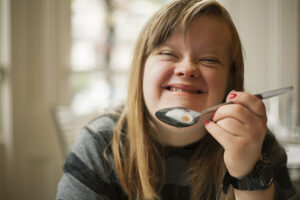There are many common myths associated with sexuality and disability such as people with disabilities are asexual, have more important things to do than sex, and people with physical disabilities are unable to have sex.1 However, people with disabilities are sexual beings and their desire for sex does not differ from the general population.2
In 2010, the U.S. Census Bureau found that there were approximately 2.8 million people under the age of 15 who had a physical, intellectual, or emotional disability.2 People with disabilities are often excluded from sex education programs in schools but should have access to these programs.

Nevertheless, below are some general guidelines sexual health educators can follow for teaching sex education:2
- Keep in mind young people regardless of disability have sexual desires and a need for intimacy. To behave in a sexually responsible manner, they need skills, knowledge, and support.
- Understand young people with disabilities are more vulnerable to sexual abuse than their peers, especially those with developmental disabilities.
- Learn as much as you can about the students or young people that you work with including their families, cultural traditions, and specific disabilities. Use materials that address boundaries and limits and respecting other boundaries. Use role plays and interactive exercises if possible.
- Use concrete examples – pictures and videos are a good method for this.
Young people with intellectual disabilities often lack the knowledge needed to develop their sexual identities because resources for sexual health education have not been adequately provided to this segment of the population. Studies show 69% of individuals with severe intellectual disability have experienced some form of sexual abuse.3 Women with developmental disabilities are particularly vulnerable as the U.S. Department of Justice found 68-83% of women in this group had been victims of sexual assault.3 The National Crime Victimization Survey concluded an average of 59,000 adults with disabilities are raped or sexually assaulted each year, and approximately 50% of all adults with intellectual disabilities will have endured ten or more incidents of sexual abuse in their lifetimes.4 These data are alarming considering individuals with disabilities also experience high rates of mental, emotional, and physical abuse when compared to the general population.2
Intellectual and developmental disabilities are often conflated. There is a difference between these two conditions though they tend to be diagnosed in individuals before the age of eighteen.
They also share the following probable causes: malnutrition, trauma, chromosomal abnormalities, and prenatal infections.5“Intellectual disability specifically pertains to intellectual and adaptive deficits whereas developmental disability is an umbrella term for a group of conditions characterized by impairments which includes intellectual disability”.5
Sex education for young people with developmental and intellectual disabilities is very important. These links will provide you with some valuable resources for teaching sex education to this vulnerable population:
- http://www.fddc.org/sites/default/files/file/publications/Parents-book-2011-LRes.pdf
- FLASH lesson plans for Special Education – King County
- Home – Woodbine House. Lots of useful resources can be found on this website.
- Puberty – MARSHmedia
- The Growing Up Guide for Girls: What Girls on the Autism Spectrum Need to Know!: Hartman, Davida, Suggs, Margaret Anne: 9781849055741: Amazon.com: Books
It is often difficult talking to young people with disabilities about sexual health. However, the conversation will likely keep our young people safe from sexual assault and help them to develop into sexually mature adults.
Written by: Terence Hodges-Health Educator, Candor Health Education
Sources:
- Sexuality, Healthy Relationships, and Disability: Slide 1 (esc1.net)
- Sexual Health Education for Young People with Disabilities: Sexual Health Education for Young People with Disabilities – Research and Resources for Educators – Advocates for Youth
- Sexual Health Education for Individuals with Disabilities: A Call to Action. https://www.unr.edu/nevada-today/news/2019/sexual-health-for-individuals-with-disabilities
- Sexual Education Resources – Respect Ability
- Difference Between Intellectual Disability and Developmental Disability | Difference Between
